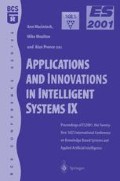Abstract
An electronic market has been constructed in an on-going collaborative research project between a university and a software house.The way in which actors (buyers, sellers and others) use the market wi be influenced by the information available to them, including information drawn from outside the immediate market environment. In this experiment, data mining and filtering techniques are used to distil both individual signals drawn from the markets and signals from the Internet into meaningful advice for the actors. The goal of this experiment is first to learn how actors will use the advice available to them, and second how the market will evolve through entrepreneurial intervention. In this electronic market a multiagent process management system is used to manage all market transactions including those that drive the market evolutionary process.
Access this chapter
Tax calculation will be finalised at checkout
Purchases are for personal use only
Preview
Unable to display preview. Download preview PDF.
References
Israel M. Kirzner Entrepreneurial Discovery and the Competitive Market Process: An Austrian Approach“ Journal of Economic Literature XXXV (March) 1997 60–85.
R. Guttman, A. Moukas, and P. Maes. Agent-mediated Electronic Commerce: A Survey. Knowledge Engineering Review, June 1998
Moshe Tennenholtz. Electronic Commerce: From Economic and Game-Theoretic Models to Working Protocols. Invited paper. Proceedings Sixteenth International Joint Conference on Artificial Intelligence, IJCAI’99, Stockholm, Sweden
Milgrom, P. Auction Theory for Privatization. Cambridge Univ Press (2001).
Bichler, M. The Future of E-Commerce: Multi-Dimensional Market Mechanisms.Cambridge University Press (2001)
Sandholm, T. Agents in Electronic Commerce: Component Technologies for Automated Negotiation and Coalition Formation. Autonomous Agents and MultiAgent Systems, 3(1), 73–96.
Strobel, M. Design of Roles and Protocols for Electronic Negotiations. Electronic Commerce Research Journal, Special Issue on Market Design 2001.42
Peyman Faratin. Automated Service Negotiation Between Autonomous Computational Agents. PhD dissertation, University of London Dec 2000
R. Wise & D. Morrison. Beyond the Exchange; The Future of B2B. Harvard Business review Nov-Dec 2000, pp86–96
Neeman, Z. & Vulkan, N. Markets Versus Negotiations. The Hebrew University of Jerusalem Discussion Paper 239.February 2001
Bulow, J. & Klemperer, P. Auctions Versus Negotiations. American Economic Review, 1996
Kumar, M. & Feldman, S.I. Business Negotiations on the Internet. Proceedings INET’98 Internet Summit, Geneva, July 21–24, 1998
B. Kovalerchuk & E. Vityaev. Data Mining in Finance: Advances in Relational and Hybrid Methods. Kluwer,2000
J. Han, L.V.S. Lakshmanan & R.T. Ng. Constraint-based multidimensional data mining. IEEE Computer, 8,46–50, 1999.
Han, J. & Kamber, M. Data Mining: Concepts and Techniques. Morgan Kaufmann 2000.
Chen, Z. Computational Intelligence for Decision Support. CRC Press, Boca Raton,2000.
Feldman, S. Technology Trends and Drivers and a Vision of the Future of e-business.Proceedings 4th International Enterprise Distributed Object Computing Conference,September 25–28, 2000, Makuhari, Japan.
Fischer, L. (Ed). Workflow Handbook 2001. Future Strategies, 2000.
Debenham, J.K.. Supporting knowledge-driven processes in a multiagent process management system. Proceedings Twentieth International Conference on Knowledge Based Systems and Applied Artificial Intelligence, ES’2000: Research and Development in Intelligent Systems XVII, Cambridge UK, December 2000, pp273286
Jain, A.K., Aparicio, M. and Singh, M.P. “Agents for Process Coherence in Virtual Enterprises” in Communications of the ACM, Volume 42, No 3, March 1999, pp6269
Jennings, N.R., Faratin, P., Norman, TJ., O’Brien, P. & Odgers, B. Autonomous Agents for Business Process Management. Int. Journal of Applied Artificial Intelligence 14 (2) 145–189, 2000.
Robert Skinstad, R. “Business process integration through XML”. In proceedings XML Europe 2000, Paris, 12–16 June 2000.
Guarino N., Masolo C., and Vetere G., OntoSeek: Content-Based Access to the Web,IEEE Intelligent Systems 14(3), MaylJune 1999, pp. 70–80
Uschold, M. and Gruninger, M.: 1996, Ontologies: principles, methods and applications. Knowledge Engineering Review, 11(2), 1996.
Miiller, J.P. “The Design of Intelligent Agents” Springer-Verlag, 1996.
Rao, A.S. and Georgeff, M.P. “BOI Agents: From Theory to Practice”, in proceedings First International Conference on Multi-Agent Systems (lCMAS-95), San Francisco,USA, pp 312–319.
Finin, F. Labrou, Y., and Mayfield, J. “KQML as an agent communication language.”In Jeff Bradshaw (Ed.) Software Agents. MIT Press (1997).
Kaplan, Steven and Sawhney, Mohanbir. E-Hubs: The New B2B Marketplace. Harvard Business Review 78 May-June 2000 97–103
Shane, Scott. Prior knowledge and the discovery of entrepreneurial opportunities.Organization Science 11 (July-August), 2000, 448–469.
Author information
Authors and Affiliations
Editor information
Editors and Affiliations
Rights and permissions
Copyright information
© 2002 Springer-Verlag London
About this paper
Cite this paper
Debenham, J. (2002). Supporting the actors in an electronic market place. In: Macintosh, A., Moulton, M., Preece, A. (eds) Applications and Innovations in Intelligent Systems IX. Springer, London. https://doi.org/10.1007/978-1-4471-0149-9_3
Download citation
DOI: https://doi.org/10.1007/978-1-4471-0149-9_3
Publisher Name: Springer, London
Print ISBN: 978-1-85233-530-4
Online ISBN: 978-1-4471-0149-9
eBook Packages: Springer Book Archive

